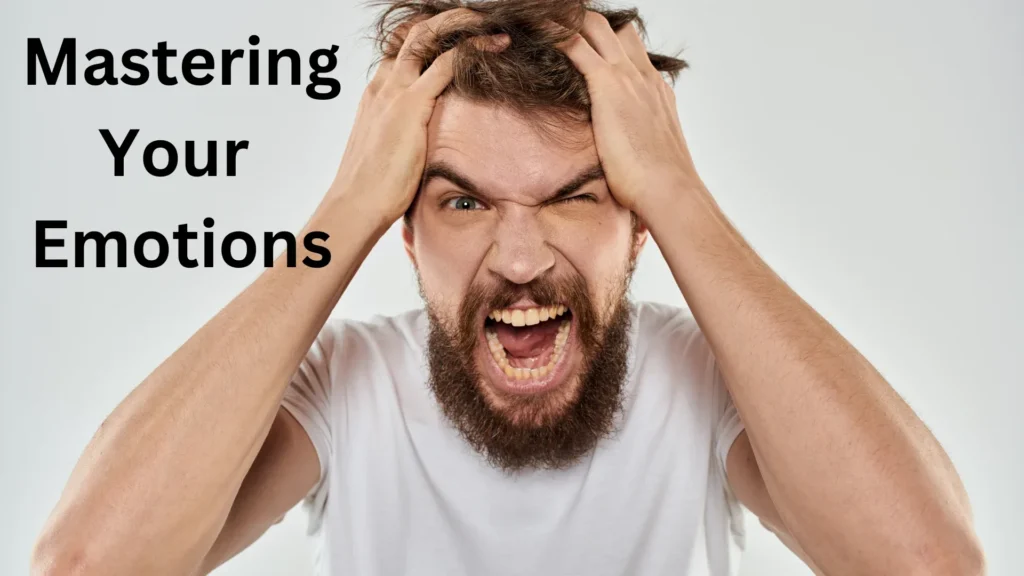
Introduction
In the world of high achievers, whether you’re an athlete, business professional, musician, or artist, mastering your emotions is often the key differentiator between success and mediocrity.
Emotions are an intrinsic part of the human experience, and they can be both your greatest ally and your most formidable adversary on the journey to peak performance.
In this article, we will delve into what emotions are, why mastering them is crucial, and how mastering does not mean controlling.
We’ll also explore how mastering your emotions can propel you towards peak performance and provide eight actionable steps to help you achieve emotional mastery.
What Are Emotions?
Emotions are complex, multi-dimensional psychological experiences that include a wide range of feelings, from joy and excitement to fear and sadness.
They are the product of complex interactions between our thoughts, physiological responses, and behaviors.
As a high performer you are aware of how emotions come into play throughout the performance experience and their impact on the outcome.
Emotions are an ever-changing experience that influences our decision-making, energy levels, and overall well-being.
Emotions can either elevate you to peak performance or hinder your progress.
This is what makes mastering your emotions so important.
Why You Learn to Master Your Emotions
The importance of mastering your emotions cannot be overstated.
For athletes, it can mean the difference between winning and losing, breaking records or falling short, and ultimately achieving greatness or settling for mediocrity.
However, this concept extends far beyond the world of sports.
Business professionals, musicians, and performing artists can all benefit greatly from emotional mastery in their respective fields.
Emotions influence the decisions we make.
When you master your emotions, you’re less likely to make impulsive choices driven by anger, fear, or frustration.
Instead, you’ll make decisions based on reason, rationality and values.
This improves the quality of your decisions and yields better results.
How often have emotions gotten the best of you?
Emotions so strong that you felt beat up and then gave up.
Mastering your emotions improves your resilience.
Life is filled with challenges and setbacks.
Emotionally resilient individuals are better equipped to bounce back from adversity, learn from their experiences, and continue striving for excellence.
Mastering your emotions can lead to better interpersonal relationships.
You’ll communicate more effectively, empathize with others, and resolve conflicts with greater ease.
This is because your emotions are no longer telling you what to do.
The impulsivity I mentioned above is reduced and this makes a big difference when choosing what to say and do around others!
Ultimately, it is about peak performance.
In the context of athletics and high achievement, emotional mastery is a prerequisite for achieving peak performance.
It enables athletes to stay focused, maintain confidence, and perform consistently under pressure.

Mastery Does Not Mean Control
Despite being common and often used phrases, mastering your emotions and developing emotional control are actually dangerous ways to think about our relationship with them.
This is because we simply cannot truly master or control them.
And I’ll prove it to you in one simple example.
I will give you one million dollars if you can do this.
Go outside and the very first stranger you see, I want you to fall madly in love with him or her.
Do this and the money is yours!
But you can’t, can you? No matter how badly you want to, it is impossible to create deep affectionate love for someone you’ve never met.
You could act like it.
You could hug or kiss them, say “I love you” every day, and even get married to them.
But instantly feel deep love?
No!
Even if you happen to see your celebrity crush, you might feel strong infatuation or a number of other things, but deep love wouldn’t be one of them.
It turns out that the presence of emotions such as sadness, anger and anxiety is not the problem.
It is the struggle to control them that is the problem.
When we struggle to control something we cannot control we are distracted and have little energy left over for what is most important in our lives.
So when I talk about mastering your emotions, I mean mastering your response to your emotions.
We do have control over our behavioral actions and reactions to our internal experiences.
Our best response to emotions is with mindful acceptance.
Mindfulness involves being fully present in the moment and observing your thoughts and feelings without attachment.
This practice allows you to gain perspective on your emotions and reduces their power over you.
Acceptance is not resignation.
It doesn’t mean that you need to like or enjoy the emotions either.
It simply means to acknowledge them without judgment.
You accept them because the reality is that you are experiencing them.
By giving up the struggle to control them, you are free to act in a way that moves you closer to your goals, bringing the uncomfortable feelings along with you.
I know this doesn’t sound fun.
It isn’t.
It can also be difficult.
However, developing this psychological flexibility is the most effective way to relate to difficult emotions.
Psychological flexibility involves being open to experiencing a wide range of emotions without avoiding or escaping them.
This flexibility allows you to adapt to different situations and respond effectively to challenges.
How Can Mastering Your Emotions Help You Reach Peak Performance
In my experience as a sport psychologist, athletes will come to me with the false belief that they need to “think positive” and “feel confident” so that they can play their best.
As if these positive thoughts and feelings are a requirement for peak performance.
That is simply not true!
Your actions are independent of what you think and feel.
You’ve experienced this independence if you ever went to work or class when you didn’t want to.
If you ever got out of bed when the alarm went off when you really wanted to sleep in.
If you were ever so angry at someone that you just wanted to yell at them, but didn’t.
In these instances, you unhooked from your emotions and didn’t act on them.
You didn’t let them dictate your behaviour.
This type of emotional mastery freed you up to engage the things that do enhance your performance, like:
Enhanced Focus: Emotions like anxiety and anger can be distracting.
When you unhook from your emotions, you can maintain a laser-like focus on your goals and tasks, which is crucial for peak performance.
Increased Confidence: Emotional mastery boosts self-confidence.
When you unhook from unhelpful emotions like fear and doubt you’re at least freed to act in a way that is helpful for goal achievement.
As a positive side-effect, confidence can arise and help you remain calm under pressure.
Again, these positive feelings aren’t required.
It’s a bonus when they show up though because it does make focusing easier.
Optimal Arousal Levels: Emotions can affect your physiological arousal levels.
Mastering your emotions allows you to maintain an optimal level of intensity, which is essential for peak performance.
It prevents you from becoming overly anxious or too relaxed.
Improved Stress Management: High achievers often face significant stress.
Mastering your emotions equips you with the tools to manage stress effectively, which can enhance your pursuit of excellence.

Mastering Your Emotions for Peak Performance in 8 Steps
Now, let’s get practical.
Here are eight actionable steps to help you master your emotions and prepare yourself for peak performance (with links to helpful videos for more details):
- Unhook: I use the word “unhook” often in the text above.
I have free training video on how to do this that I encourage you to watch.
It is a skill that can be developed with practice. I promise you, nothing will help you more. Here is a quick technique you can use right away.
- Notice: Nothing happens without awareness.
So your first step is to simply set an intention and pay attention to the triggers, patterns, and physical sensations associated with different emotions.
Self-awareness is the first step towards emotional mastery.
- Mindfulness Practice: Incorporate mindfulness techniques into your daily routine.
This could include meditation, deep breathing exercises, or simply taking moments throughout the day to check in with your thoughts and feelings.
- Acceptance: Practice accepting your emotions without judgment.
Remember that it’s okay to feel a wide range of emotions, and they don’t define your worth or abilities.
- Cognitive Restructuring: OK, so I’ve talked a lot about accepting thoughts and feelings.
At the same time, when you can challenge and reframe the negative or unhelpful thoughts that contribute to intense emotions, feel free to do so!
Replace them with more constructive and rational thinking patterns.
Again, this isn’t always possible, but when it works it can be helpful to move you forward.
- Emotional Regulation: Learn techniques for regulating your emotions, such as progressive muscle relaxation, biofeedback, or visualization exercises.
- Stress Management: Develop a stress management plan that includes physical activity, adequate sleep, and healthy nutrition.
These factors play a significant role in emotional regulation.
- Practice S.E.E., an incredibly powerful technique to help you act more intentionally when engaging intense emotions.
While all of these strategies can enhance emotional control, if you find yourself feeling overwhelmed and/or in a significant performance decline, consider working one on one with a performance psychologist.
This individualized attention provides you with personalized strategies unique to your situation and support on your journey.
Conclusion
Mastering your emotions requires time, effort, and dedication, but the rewards are well worth it.
Whether you’re an athlete striving for peak performance, a business professional aiming for success, or an artist seeking creative excellence, emotional mastery is the key to unlocking your full potential.
Remember that mastery doesn’t mean control.
Rather it is mastery over your behavioral reactions via mindful acceptance that provides the greatest benefit.
Give the 8 strategies a try, and join me inside Success Stories Membership for additional support in mastering your emotions.



